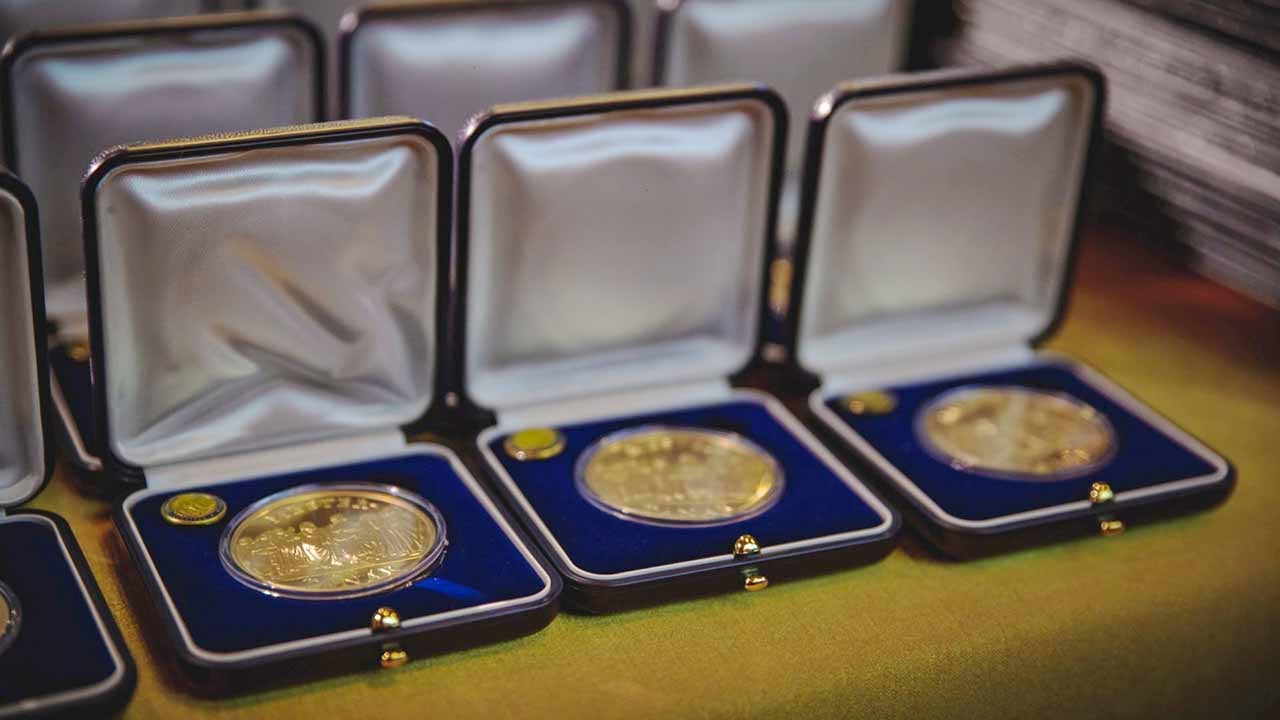A Golden Career – Interview with Two Corvinus Master Teachers

For their more than decade-long outstanding work in student mentoring and scientific student organization, Áron Török received the gold medal in the Agricultural Sciences Section, while Veronika Pelle was honored in the Social Sciences Section. In our interview, they share insights into their talent development and academic organizing work, research practices, and what this recognition means to them.
A Career as a Supervisor
Áron Török, university professor and head of the Department of Agricultural Economics, has also been a research supervisor since 2009. “As soon as I started my doctoral studies, I was given this responsibility”, he recalled about the beginning of his career. Although he started young, he quickly adapted to his new role. “Among supervisors, we often say there are people with a ‘TDK vein’—they were born for this kind of work”, he added. His extensive experience also comes from his own student research competitions, as he himself competed in both TDK (Scientific Students’ Associations) and OTDK (National Scientific Students’ Associations Conference), achieving notable placements.
Veronika Pelle, assistant lecturer at the Department of Communication and Media Studies, has been involved in the TDK talent development program since 2013.“I first participated as a reviewer, later as a supervisor and jury member, and we also hold preparatory sessions for our students”, she recalled. As a student, she too participated in TDK, after one of her professors nominated her first-year seminar paper for competition. “You never stop learning, but perhaps what I’ve changed the most is that I try to make my supervision as personalized as possible”,
she shared about her mentoring and teaching experience. “As supervisors, an essential part of our work is to give constructive professional feedback and hold up a mirror to students—helping them see themselves in a new light. For many, this reflection and encouragement are what make them realize they’re capable of achieving things they previously thought beyond their reach”,
Veronika emphasized.
She also shared emotionally that she still feels honored whenever a student chooses her as their supervisor and partner on their academic journey. “In a world full of opportunities for young people—often accompanied by anxiety and time pressure—it’s always a joy to see a student focus their attention and energy on researching an issue that truly matters to them. I feel deep gratitude when a student deems me worthy to guide them as they take their first steps on the path of scientific discovery.”
Áron also recalled his most memorable experiences as a supervisor: “My fondest memory is connected to a pair of siblings with whom I now work as colleagues in the department. One of them even earned the Pro Scientia gold medal through persistent effort.”
Research, Thesis Writing, and TDK
The very first step in research or thesis writing is choosing a topic—which can often be challenging. Both Veronika and Áron agree that the best topic is one that genuinely interests and engages the student. “If they’re truly interested and have some personal connection to the topic, that’s ideal”,
Áron said.
“It’s common that over time—given the long and demanding nature of research—students grow tired of their topic, even if they were passionate about it at first”, Veronika noted, emphasizing the importance of choosing a subject one is sincerely curious about. Her main advice: find a problem in your surroundings that fascinates you, raises questions, and still awaits a solution. The next step is reading and exploring existing research on the subject.
“The most common challenge I encounter is time management”, Veronika explained. When the task feels unfamiliar or overwhelming, procrastination is an easy trap to fall into. Participating in TDK helps students practice and refine this skill within a complex cognitive process—after that, few unpredictable obstacles remain on the road to completing their paper.
Research is a multifaceted process requiring structured and critical thinking, perseverance, patience, accuracy, and precision. Students must learn to ask the right questions, distinguish between essential and irrelevant information, and then synthesize and present their findings concisely. Supervisors support this process with guidance, methodological advice, professional feedback, and academic connections.
The Master Teacher Gold Medal
“You must burn with what you want to ignite in others.” – St. Augustine. This quote inspires Veronika Pelle’s teaching and supervisory philosophy. The Gold Medal holds great meaning for her, as she is deeply committed to nurturing young talent—giving students opportunities to flourish and passing on the passion that has driven her from the start. She dedicates the award to her own former teachers, who once inspired her in the same way.
For Áron Török, the most inspiring aspect of academic work is supervision and mentoring the next generation of researchers. “This is the crowning achievement of a twenty-year career—I started at twenty, and now, at forty, I’ve received this award”, he said proudly. To him, it represents validation and appreciation for the time and energy he has devoted to his students year after year.
Beyond the academic value—such as a high-ranking TDK paper substituting for a mandatory thesis—participation in research competitions offers additional benefits. As Veronika puts it: “Through publications and conference presentations born from TDK work, a student preparing for an academic career can get ahead of themselves—even before starting a PhD.” Moreover, it’s a valuable professional experience, as it demonstrates curiosity, creativity, perseverance, and a willingness to invest extra time and effort into high-level projects—qualities that are highly regarded on the job market.
In addition to Áron Török and Veronika Pelle, two other outstanding Corvinus lecturers received the Master Teacher Gold Medal in 2025:
-
Milán Csaba Badics – Economics Section
-
Melinda Jászberényi – Economics Section
More details are available here.
Source: Közgazdász Online
Written by: Efi Bekiarisz